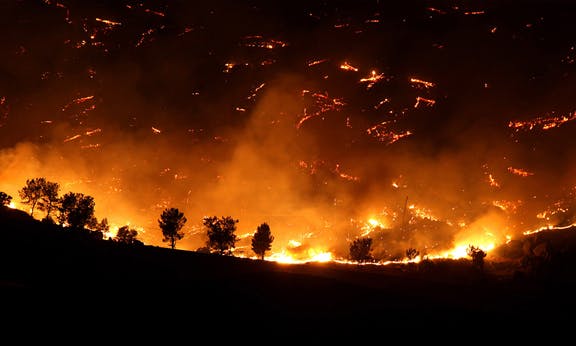The climate emergency is already here

The 2015 State of the Climate report, released by the US National Oceanic and Atmospheric Administration in early August, paints a frightening picture of a rapidly warming world. The report draws on the work of 450 scientists from 62 countries, and shows that the effects of climate change are already hitting hard.
2015 was confirmed as the warmest year on record, beating the previous high, set in 2014, by 0.13 degrees Celsius – the biggest year-on-year jump in the record since 1998. This is part of a definite trend, with 15 out of the 17 warmest years coming since 2000.
Over the past two centuries, the world has warmed by 1 degree. If current trends continue, it will warm by another 1 degree in less than a decade. This isn’t a matter of just a few more days of beach weather in summer. The world’s environmental systems are like the human body – a temperature rise of 1 degree is enough to put them seriously out of balance.
The long list of extreme climatic events documented in the report shows the effects of this global “fever”: devastating droughts in Africa, South and Central America, and China; record breaking heat in Alaska, Canada, Argentina, Europe, India and Australia; floods in the US, Mexico and Morocco; and a big uptick in the number of powerful cyclones forming in the tropics.
A particularly strong El Niño in the Pacific Ocean – a cyclic phenomenon in which a large pool of warmer than average water accumulates in the ocean’s eastern half – contributed to the extreme weather. But it was far from being the whole story.
El Niño conditions have now ended, yet the record warmth has continued. This year is on track to be warmer again. In late February and early March, average temperatures across the northern hemisphere briefly broke through the “milestone” of 2 degrees warmer than pre-industrial levels. This is the figure commonly regarded by scientists as the maximum beyond which dangerous, runaway warming becomes inevitable.
Temperatures in the Arctic were particularly extreme. In some areas, the February average was more than 16 degrees above normal. Unsurprisingly, the maximum extent of winter sea ice reached a new record low.
In May 2016, there was a devastating heat wave in India and Pakistan, with temperatures reaching a new high for the region: 51 degrees Celsius. Casualty figures are hard to come by, but the toll will far exceed the 2,500 people officially recorded as dying from excessive heat during a similar, but less severe, heat wave last year.
In July, there was again record heat. In Kuwait and southern Iraq, temperatures rose to 54 degrees – equalling the hottest reliably recorded surface temperature on earth.
The most alarming thing is that this is just the start. The report documents that the increase in the concentration of greenhouse gases in the atmosphere – the underlying driver of climate change – is accelerating.
Last year, the biggest ever 12-month jump in atmospheric carbon dioxide levels was observed at the Mauna Loa Observatory in Hawaii – a rise of 3.1 parts per million. This compares with an average increase of 2.1 ppm a year over the last decade, and 0.6 ppm a year in the early 1960s.
The UN climate summit in Paris last December was supposed to be a major breakthrough. Already it has been revealed as too little, too late. Even if all of the emissions reduction pledges made at the conference were honoured, the world would still likely smash through the 2 degree “safe limit” of warming. Given that governments are already manoeuvring to get out of their commitments, this seems like an optimistic scenario.
This isn’t a time for more negotiations and diplomacy. It’s not a matter of explaining the situation to those in positions of power. It’s not that the world’s business and political elite don’t understand the science. They understand it perfectly, and they know it implies a curb on their much vaunted freedom to enrich themselves at the expense of the planet and the majority of people who live on it.
Red Flag has consistently argued that a solution to the climate crisis can come only through a break with capitalism. Perhaps there was a time when we could reform our way to a more sustainable global economy. That time is gone. Only a revolution can save us from a global environmental catastrophe.